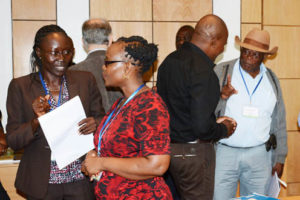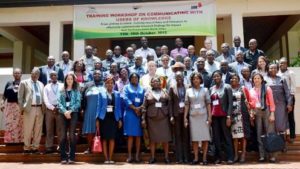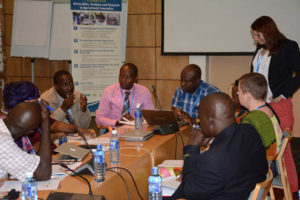In October the African Network for Agriculture, Agroforestry and Natural Resources Education (ANAFE) organized a training on communicating research results to users of knowledge. Important user groups can be found at all levels – from the field to the policy making table.
For more than a year I was involved in the planning of ANAFE’s training andwas more than happy to be part of the team when the training was held in Nairobi in October.
 The theme is central to FoodAfrica, as our research becomes truly significant only once we are able to communicate the results to end-users, hopefully making an impact in the lives of people on the ground. However, reaching this goal is neither easy nor straight forward.
The theme is central to FoodAfrica, as our research becomes truly significant only once we are able to communicate the results to end-users, hopefully making an impact in the lives of people on the ground. However, reaching this goal is neither easy nor straight forward.
Who are the users of knowledge?
In planning the training we were faced with the question” who are the key participants we need to involve?” We agreed that for the training itself the most important group consists of researchers and teachers from African universities. They are in a position to make a big impact, when transferring their vision and knowledge to students. Making students active, innovative and taking a participatory approach to their work can have major long-term impacts on the way research is conducted – and disseminated.
Participants from more than 20 countries

Participants representing more than 20 African countries, from ANAFE’s vast network of partner universities, werer selected for the training to share their own experiences, views and opinions. This led to many long, intense and very interesting discussions on topics ranging from different aspects of student learning processes to sustainability of farming systems.
There was a consensus that teaching at African Universities often follows a quite traditional pattern and a lot could be done to make students take more responsibility for their own studies, which will help them understand the nature of scientific research and allow for better learning results.
New approach needed in information dissemination
Not only students, also training material, need to be approached in a new way. It is essential for researchers to learn to develop material suitable for many different groups and levels E.g. communicating results to farmers can no longer be considered a separate issue from research itself,. It needs to be integrated into all research programs, preferably already at the planning stage.
 This is not easy. Therefore a manual, to support researchers in this process, is being developed, based on the workshop. The manual is intended as a tool that can be used at all stages in the research process. Once ready it will be circulated widely within the ANAFE network and beyond.
This is not easy. Therefore a manual, to support researchers in this process, is being developed, based on the workshop. The manual is intended as a tool that can be used at all stages in the research process. Once ready it will be circulated widely within the ANAFE network and beyond.
Although many of the participants were extremely knowledgeable and experienced experts in their fields with a long teaching experience, everyone approached the training with an open mind, ready to learn and take on board new idea.
Back home, each participant can start working with their own community to slowly change the way researchers communicate results. A lot still needs to be done but there are a lot of good people out there to do it!
Text: Project Coordinator Mila Sell, Natural Resources Institute Finland (Luke)

